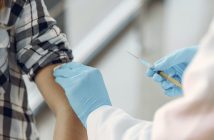Vast quantities of illegal and possibly dangerous vaccines have been distributed to medical facilities across China, it has emerged.
The vaccines were manufactured by licensed producers, but were stored and transported without being properly refrigerated. A former doctor and her daughter from Shandong have been arrested for selling illegal supplies worth RMB 570 million across 18 provinces over a five year period. Now drug regulators are working with police and the health ministry to follow the trail of the spoiled vaccines. They have published a list of people suspected of buying and selling the supplies, and asked them to come forward with information.
RELATED: In the Wake of Scandal, Should You Get Your Child Vaccinated in Beijing?
Initial reports suggested that spoiled vaccines can cause serious side effects, including paralysis and even death. However the World Health Organization (WHO) hurried to calm fears. "It is important to note that improperly stored or expired vaccines seldom, if ever, cause a toxic reaction. Therefore, there is likely to be minimal safety risk in this particular situation," they said in a statement issued yesterday. However the vaccines may be ineffective, leaving children vulnerable to a range of diseases such as polio, mumps, rabies, hepatitis B, encephalitis, and meningococcal diseases.
The news comes as a blow to China’s developing pharmaceutical industry, which hoped to enter the global market after its first vaccine was prequalified by the WHO as suitable for export in 2013. There was anger when it was revealed that the two women were detained last April, but that the information has only been made public now. It has also been alleged that the mother, named only as Pang, had been arrested for the same offense in 2009 and was given a suspended sentence.
We have no information to suggest that the vaccines concerned have been distributed in Beijing. International health organizations use a combination of imported and locally sourced products, since there are strict controls on the importation of medicines, but they operate to stringent safety standards. One local provider, Beijing United Family Hospital and Clinics, has issued a statement reassuring families that they have "a strict, rigorously professional program to protect the integrity of [their]vaccinations and maximize safety."
Nonetheless parents from the international community have reacted with alarm and anger to this latest medical scandal. We spoke to Jerry, a father who cited worries about clinical standards as one of his reasons for leaving China and returning to the USA.
"Our son has been immunized locally here," he told us. "We got most of our immunizations done at the local community clinic. As a parent it’s definitely very concerning. I doubt that we have been affected, but it’s very distressing to see how unscrupulous, unethical, and just downright evil some people here are for the sake of money."
Other parents shared their worries via social media.
Zach, an American expatriate and father, said, "I’m very concerned, my son is scheduled to get his hepatitis B vaccine in April. I’m doing more research on it now, as I don’t really have all the information but at this point, like most parents, it’s very scary to even think about getting it done and putting a child at risk, and if we don’t do it the child is still at risk."
Some parents are losing faith in the whole immunization program. Shane, another American dad, told us: "I simply don’t believe in pumping a young body full of these vaccines before the child can even walk. There is a minimal amount of vaccine that can be given over time but until the child’s body reaches about seven or eight years old they still have not fully developed. Eight years of age is the age of reason and when the brain and emotions and central nervous system start all working together at a higher level. Prior to that their bodies are quite sensitive and underdeveloped internally. I believe you should wait till many of these biological and psychological milestones are formed before any kind of aggressive vaccine schedule."
The WHO though emphasizes the importance of immunization for protecting both children and communities. In a 2008 bulletin they stated: "Without doubt, vaccines are among the most efficient tools for promoting individual and public health and deserve better press."
Anybody who is concerned is advised to speak to their family doctor.
Photo: Grook Da Oger




